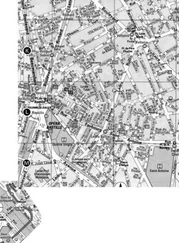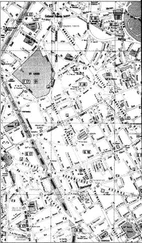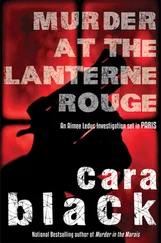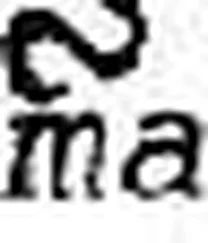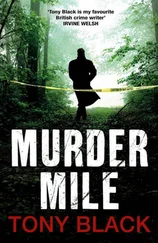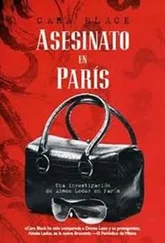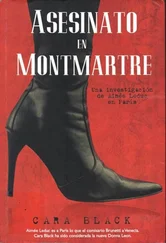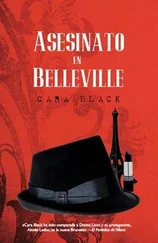“À bientôt, mes princesses.” He winked and ran down the Metro steps.
Shadows burnished the shop windows, passersby hurried along the street. The last rays of light illumined cottony puffs of clouds framed by the sloping tiled rooftops. The incandescent clouds were tinged with yellow, as though lit from within, reminiscent of a Monet sky.
Aimée wrapped Stella tighter in the blanket that enfolded the baby in the carrier on her chest. She was about to hail a taxi for Leduc Detective when she realized that she was standing in front of the blue awning of Jacadi, the upscale baby store. The window display had a christening theme featuring a delicate christening gown trimmed with lace, surrounded by white sugar-coated almonds— de rigueur for a bourgeois baptism—that had been sprinkled among a phalanx of stuffed animals.
The shop door opened to reveal a young woman wheeling twins in a double stroller. The clerk, a middle-aged woman with her hair in a chignon and appraising eyes, held the door for her. Stella stuck out her little fists and Aimée could have sworn that she was pointing in the direction of a pink terrycloth onesie in the side window.
“Looks like your daughter knows what she wants,” the clerk said.
Newborns couldn’t focus farther than a meter, according to the baby manual. Aimée stroked Stella’s velvety ear. And in the next moment, she found herself standing inside the store, which was filled with every kind of infant clothing possible.
“You were born with fashion sense, too, Stella,” she whispered.
SHE LEFT THE shop hoping Stella would wear the expensive onesie longer than it took her to sneeze. Stella seemed to grow a size a day. Horns honked from cars jammed in the rond-point evening traffic. The taxi stand lay just ahead.
“Aimée?”
Startled, she turned at the corner, bag in hand, Stella strapped on her chest, to stare into the face of Yves, her former boyfriend. In a pinstripe suit and long hair, he was more of a hunk than ever. She felt her face flush. A stream of passersby parted around them, as if they were rocks in the middle of a current, then flowed together again at the zebra crosswalk.
“You’ve been busy,” Yves said.
She couldn’t tell if the expression in his eyes was hurt, wonder, or both.
He leaned down and brushed her cheek with his lips, inhaling her scent. “You still wear Chanel No. 5.”
“And you’re still in Cairo.” More of a question than a statement.
“I’m bureau chief now.” He gave a wistful sigh. “You’re radiant, Aimée. Motherhood becomes you.”
Words caught in her throat. She remembered the little mole behind his ear, how he hummed Coltrane’s ballad “Crescent” when he cooked, the way his legs had wrapped around her under her duvet.
“What’s your daughter’s name?”
She stared at him, found her tongue. “Stella. Her name’s Stella.”
“Aaah, you always had a thing for the stars.”
And you, she almost said.
“Remember this?” She felt around in her bag, found the lucky Egyptian coin, the one he’d given her on a street corner in Cairo when they’d said good-bye.
A beeping came from her phone, indicating a message. Yves stared at the coin, then at her phone. “Don’t you think you should check that?”
She hit the voice-mail button and listened. One message. Jean Caplan’s voice. “Hélène wants to talk to you about the girl. She knows you somehow. The side door code is 78C65, Come to the back of the store. She’ll be waiting.” And then the loud buzz of a hang up.
“Have to get home, eh? Your man’s waiting,” Yves suggested, watching her.
Claude. But she wasn’t sure he was her man. She’d put Stella first last night and he’d given his freedom priority over her.
“ Non , it’s . . . it’s business,” she said. She wanted to explain, tell him everything, even on this busy street.
“Of course, you’d never stop working,” he said. “But I always thought if I gave you enough babies, well, you’d slow down.”
“You did?”
He pressed something into her hand. Another shining bronze coin covered in Arabic writing. “One can never have too much luck, Aimée.”
His cell phone rang but he ignored it. His warm hands held hers, not loosening their grasp.
“Got to go,” he said. “Another meeting. I fly back tonight.”
“Look, Yves, I—”
He put his finger over her lips. “Don’t tell me how happy you are, or that you’ve found the right one at last. It’s wonderful; I’m happy for you. And quit batting those big eyes at me, Aimée. I understand.”
But he didn’t.
“If your daughter’s anything like you . . . whoa.” He stroked Stella’s head, kissed Aimée long and lingeringly on the mouth. “You know, we’ve got to stop saying good-bye on street corners.”
Then he was gone. People hurried past her, their shoulders hitting hers as the shadows deepened. And she felt more alone than ever.
As she got out of the taxi at Jean Caplan’s brocante , she was astounded by the driver’s opening the door for her even before she produced her usual big tip. She stood in front of the shop for a moment with the baby bag over her shoulder, Stella strapped in the carrier and holding a bouquet of yellow daffodils for Hélène.
“Hélène knows you somehow,” Caplan had said. Like Nelie knew her “somehow?” Caplan had realized, seen the truth in Aimée words and convinced Hélène to talk to her. For the first time Aimée sensed she’d get answers.
She figured Hélène witnessed Orla’s killing. Then either Hélène acted in self-defense or she’d gone after the attacker. Perhaps Hélène had helped Nelie, and it was she who had written that note to Aimee. If Hélène knew where Nelie was hiding, she’d lead Aimée there.
On the pavement, a man in a blue work coat grunted as he carried a tall sheet of glass in a frame on his back. He winked at Aimée, paused, and wiped his brow with his free hand. A vitrier —a glass man—who hawked his services on the streets. One of the few who still made the rounds with their distinctive high-pitched cry “Vi-tr-ier.” A fragment of the disappearing old Paris.
Dark green metal shutters covered the front of Caplan’s shop. A dim light shone through the crack between the door shade and the glass. He’d said to use the side door; she tapped in the digicode number.
Inside, she followed the narrow brown scuffed hall to the courtyard onto which Jean Caplan’s kitchen faced. Standing by the sealed-up well she saw lights in the galley kitchen, heard what sounded like the télé blaring news.
“Time we meet Hélène,” she said. Stella answered with a wail.
She knocked, opened the unlocked door, and entered.
“Monsieur Caplan? Hélène?”
She patted Stella’s back as she edged past the hanging beaded curtains that separated the kitchen from the shop. The once exquisite chandelier, with missing crystal drops, provided the only light. Scattered piles of yellowed newspapers cluttered the floor. Stairs to the right and dark heavy curtains in front of her partitioned off what appeared to be rooms in the back.
Two half-empty demitasse cups and a blue sugar bowl with tongs sat on the small table. Were Jean and Hélène upstairs? Or in the back storeroom? Stella’s cries mixed with the evening news announcer’s words. She turned down the volume on the télé , wishing she could turn down Stella’s volume as well.
“Monsieur Caplan, I’m here,” she said, rocking the baby in her arms, rubbing the soft rolls of skin on her ankles, leaning down to blow in Stella’s ear.
And then she was shoved through the thick woolen curtains into the storeroom. Startled, she stumbled forward, throwing her arms out to protect Stella and break her fall. She grabbed a dusty wall hanging and righted herself. Aimée turned to see the glint of a gun pointed at the baby’s head. And gasped. A Beretta 87, the hit man’s weapon of choice, pioneered by the Mossad.
Читать дальше

